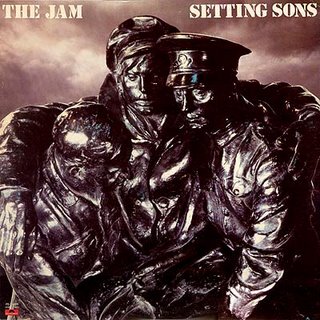
The Cover Adds Even More Panache To The Album
It was only natural that a hardened Who and Kinks fans such as Paul Weller would eventually release an album with conceptual tinges. That is exactly what characterizes the fourth album released by The Jam. The year was 1979, and the name of the release was Setting Sons.
The story involved three childhood friends who became distanced as they grew up, and the responsibilities and the toll of the adult world began manifesting themselves and settling in irretrievably. One of the characters ends up as a left-wing radical, while the other leans markedly to the right. The third character is Weller, who can see both sides clearly.
These songs stand as a lament for lost ideals (“Burning Sky”) and for youth that seems over in a flash (“Thick As Thieves”), as well as dealing with the avarice of the British Empire (the mini-suite “Little Boy Soldiers”, with Foxton playing a cello). The best-known composition (and The Jam’s first top 3 hit) is “The Eton Rifles”, a song narrated from the point of view of the left-wing radical where a scrape with some public school boys is narrated with a true touch of irony and malice.
Weller was not able to come up with enough songs to sustain the concept over the whole album, though, and that is why some songs which are unrelated are included. Prominently among them is a string-led rendition of Bruce Foxton’s most cherished Jam tune, “Smithers Jones”, whilst Weller’s “Saturday’s Kids” gives us one of the best vignettes of life as the British youth in the suburbia knew it ever put to record. Also, a character sketch named “Private Hell” is included and it does not go unnoticed. It features a demolishing bass part, which was directly inspired by the bass lines that Peter Hook (Joy Division’s bassist) used to pump out.
The album’s closer is a cover of Martha & The Vandellas’ “Heatwave”, paying direct homage to The Who – it was a mainstay in their repertoire during their “maximum R&B” years, and also for some time afterwards. It finishes the record on a low point, but the pathway that leads you there is crammed with turns and corners which are worth exploring. This is a very even record, and it is the one Jam album I still listen to with some frequency. It signals the instant Weller became a true generational spokesman. And more successes were right on the agenda – their first number one (“Going Underground”) was to be released shortly and they were to become unstoppable until Weller disbanded The Jam in 1982.
Rating: 8/10

Pingback: Extras (The Jam) – Compilation Album | MusicKO